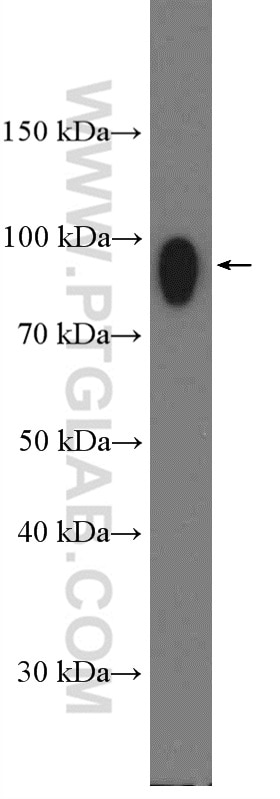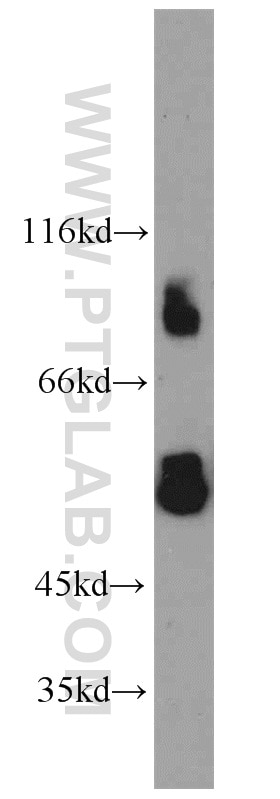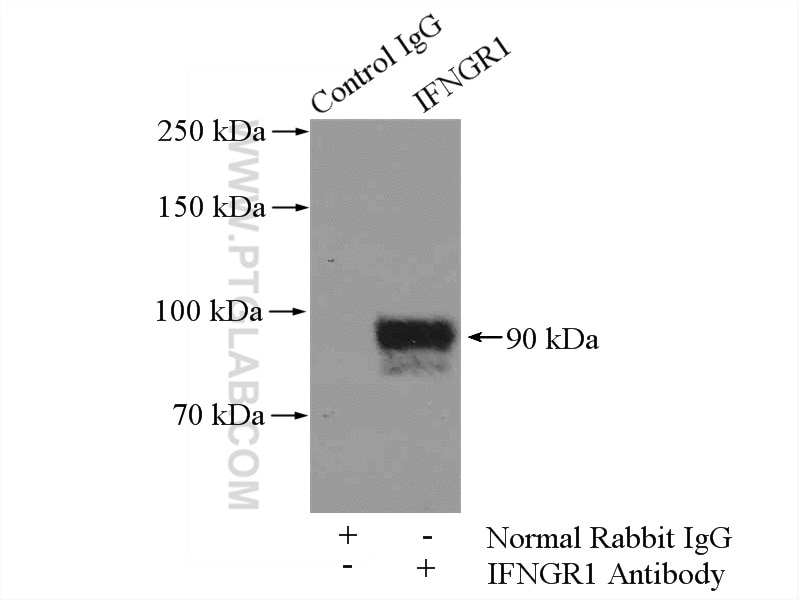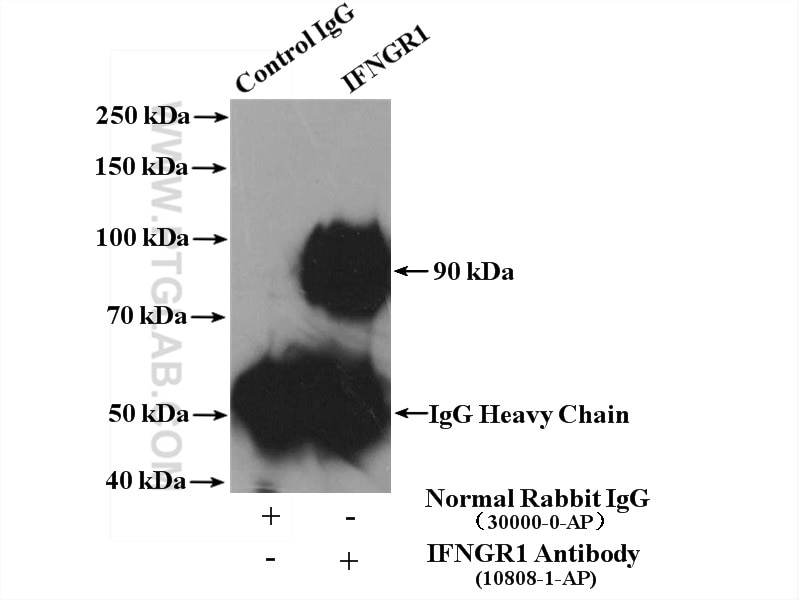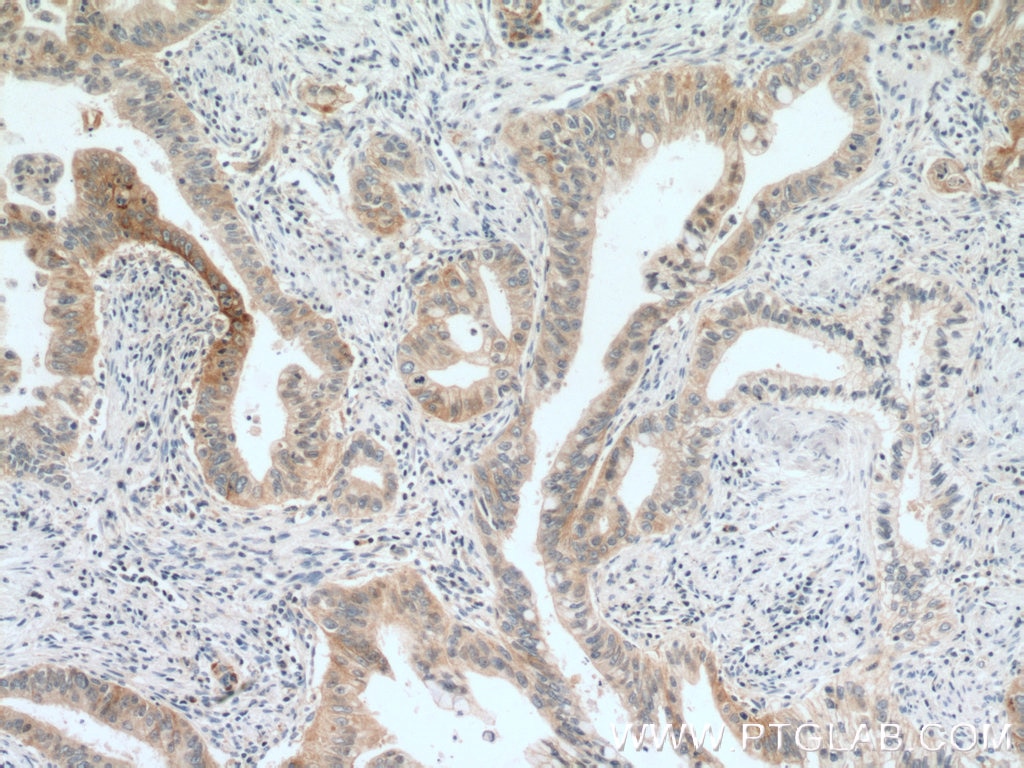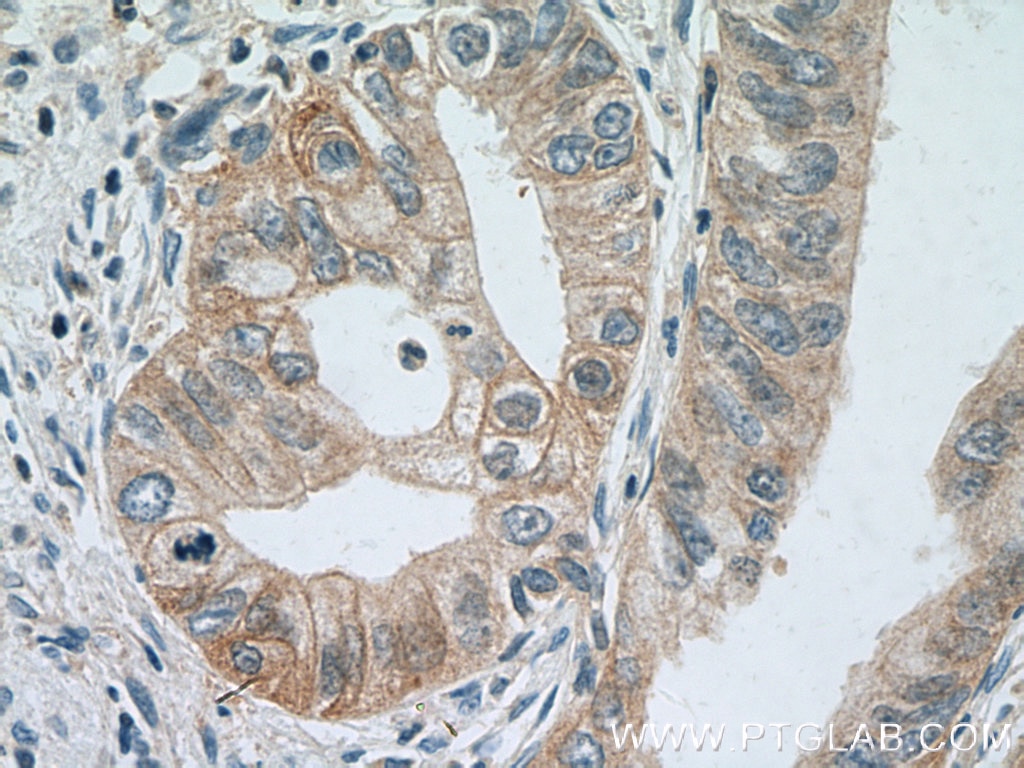- Featured Product
- KD/KO Validated
IFNGR1/CD119 Polyklonaler Antikörper
IFNGR1/CD119 Polyklonal Antikörper für WB, IHC, IP, ELISA
Wirt / Isotyp
Kaninchen / IgG
Getestete Reaktivität
human und mehr (1)
Anwendung
WB, IHC, IF, IP, ELISA
Konjugation
Unkonjugiert
Kat-Nr. : 10808-1-AP
Synonyme
Geprüfte Anwendungen
| Erfolgreiche Detektion in WB | HEK-293-Zellen, HepG2-Zellen |
| Erfolgreiche IP | HepG2-Zellen |
| Erfolgreiche Detektion in IHC | humanes Pankreaskarzinomgewebe Hinweis: Antigendemaskierung mit TE-Puffer pH 9,0 empfohlen. (*) Wahlweise kann die Antigendemaskierung auch mit Citratpuffer pH 6,0 erfolgen. |
Empfohlene Verdünnung
| Anwendung | Verdünnung |
|---|---|
| Western Blot (WB) | WB : 1:500-1:1000 |
| Immunpräzipitation (IP) | IP : 0.5-4.0 ug for 1.0-3.0 mg of total protein lysate |
| Immunhistochemie (IHC) | IHC : 1:50-1:500 |
| It is recommended that this reagent should be titrated in each testing system to obtain optimal results. | |
| Sample-dependent, check data in validation data gallery | |
Veröffentlichte Anwendungen
| KD/KO | See 1 publications below |
| WB | See 14 publications below |
| IHC | See 5 publications below |
| IF | See 2 publications below |
Produktinformation
10808-1-AP bindet in WB, IHC, IF, IP, ELISA IFNGR1/CD119 und zeigt Reaktivität mit human
| Getestete Reaktivität | human |
| In Publikationen genannte Reaktivität | human, Maus |
| Wirt / Isotyp | Kaninchen / IgG |
| Klonalität | Polyklonal |
| Typ | Antikörper |
| Immunogen | IFNGR1/CD119 fusion protein Ag1114 |
| Vollständiger Name | interferon gamma receptor 1 |
| Berechnetes Molekulargewicht | 54 kDa |
| Beobachtetes Molekulargewicht | 90 kDa |
| GenBank-Zugangsnummer | BC005333 |
| Gene symbol | IFNGR1 |
| Gene ID (NCBI) | 3459 |
| Konjugation | Unkonjugiert |
| Form | Liquid |
| Reinigungsmethode | Antigen-Affinitätsreinigung |
| Lagerungspuffer | PBS with 0.02% sodium azide and 50% glycerol |
| Lagerungsbedingungen | Bei -20°C lagern. Nach dem Versand ein Jahr lang stabil Aliquotieren ist bei -20oC Lagerung nicht notwendig. 20ul Größen enthalten 0,1% BSA. |
Hintergrundinformationen
Interferon-gamam (IFN-γ) is a cytokine critical for innate and adaptive immunity against viral and intracellular bacterial infections and for tumor control. Cellular responses to IFN-γ are activated through its interaction with a heterodimeric receptor consisting of two subunits, IFNGR1 (CD119) and IFNGR2. IFNGR1 is the ligand-binding subunit which binds IFN-γ with high affinity, whereas IFNGR2 serves as the accessory subunit. Two subunits bind one IFN-γ dimer. Defects in IFNGR1 are a cause of mendelian susceptibility to mycobacterial disease (MSMD), also known as familial disseminated atypical mycobacterial infection. (PMID: 17981204; 946248; 10888113)
Protokolle
| PRODUKTSPEZIFISCHE PROTOKOLLE | |
|---|---|
| WB protocol for IFNGR1/CD119 antibody 10808-1-AP | Protokoll herunterladen |
| IHC protocol for IFNGR1/CD119 antibody 10808-1-AP | Protokoll herunterladenl |
| IP protocol for IFNGR1/CD119 antibody 10808-1-AP | Protokoll herunterladen |
| STANDARD-PROTOKOLLE | |
|---|---|
| Klicken Sie hier, um unsere Standardprotokolle anzuzeigen |
Publikationen
| Species | Application | Title |
|---|---|---|
Cancer Discov Loss of Optineurin Drives Cancer Immune Evasion via Palmitoylation-Dependent IFNGR1 Lysosomal Sorting and Degradation. | ||
Nat Commun DENR controls JAK2 translation to induce PD-L1 expression for tumor immune evasion. | ||
Dev Cell Interferon-γ resistance and immune evasion in glioma develop via Notch-regulated co-evolution of malignant and immune cells. | ||
Oncogene Low doses of IFN-γ maintain self-renewal of leukemia stem cells in acute myeloid leukemia
| ||
Ecotoxicol Environ Saf Silica-induced macrophage pyroptosis propels pulmonary fibrosis through coordinated activation of relaxin and osteoclast differentiation signaling to reprogram fibroblasts | ||
J Neuropathol Exp Neurol Gene expression profiling of NF-1-associated and sporadic pilocytic astrocytoma identifies aldehyde dehydrogenase 1 family member L1 (ALDH1L1) as an underexpressed candidate biomarker in aggressive subtypes. |
